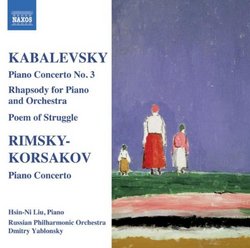| All Artists: Kabalevsky, Rimsky-Korsakov, Yablonsky, Russian Philharmonic Orchestra, Liu Title: Kabelevsky: Piano Concerto No. 3; Rimsky-Korsakov: Piano Concerto Members Wishing: 1 Total Copies: 0 Label: Naxos Original Release Date: 1/1/2008 Re-Release Date: 6/24/2008 Genre: Classical Styles: Opera & Classical Vocal, Chamber Music, Forms & Genres, Concertos, Historical Periods, Classical (c.1770-1830), Instruments, Keyboard Number of Discs: 1 SwapaCD Credits: 1 UPC: 747313279425 |
Search - Kabalevsky, Rimsky-Korsakov, Yablonsky :: Kabelevsky: Piano Concerto No. 3; Rimsky-Korsakov: Piano Concerto
 | Kabalevsky, Rimsky-Korsakov, Yablonsky Kabelevsky: Piano Concerto No. 3; Rimsky-Korsakov: Piano Concerto Genre: Classical |
Larger Image |
CD Details |
CD ReviewsSecond-Tier Russian Music for Piano and Orchestra J Scott Morrison | Middlebury VT, USA | 08/01/2008 (4 out of 5 stars) "Kabalevsky achieved great popularity in his lifetime for his easy-to-follow, easy-to-remember, always brilliantly crafted music. Today he is best remembered for his 'Comedians Suite' and for the overture to his opera, 'Colas Breugnon'. He wrote four piano concertos. The first two appeared on Naxos some years ago. Kabalevsky: Piano Concertos Nos. 1 & 2. I don't quite understand why in this release, which could have Kabalevsky's fourth piano concerto and thus complete the set, only the Third appears. It is coupled with Rimsky-Korsakoff's one-movement Piano Concerto in C Sharp Minor. The CD is then filled out by Kabalevsky's twelve-minute Rhapsody for Piano and Orchestra and a short piece for chorus and orchestra, 'Poem of Struggle.'
The Third Concerto, subtitled 'Dedicated to Soviet Youth', appeared in 1952 with the fifteen-year-old Vladimir Ashkenazy as soloist. It is optimistic and sassy, clearly having been influenced to some degree by the cheeky music of members of Les Six. It quotes folk songs in all three movements. In the second movement Kabalevsky quotes his own song, 'Our Land', which was well-known to Soviet young people. This is a happy piece, depicting in a sense the optimistic Soviet party line, and it is given a happy performance by young Ms Liu and the Russian Philharmonic under Dmitry Yablonsky. Rimsky's piano concerto has never achieved the popularity accorded Capriccio Espagnole, Russian Easter Overture or Scheherazade. But it is an attractive, if somewhat odd, piece. It is rhapsodical in form, with elements of a theme-and-variations; Rimsky makes use of a folksong, 'Gather, brothers'. Kabalevsky's one-movement Rhapsody for Piano and Orchestra was written in 1964 for a young pianists' competition. As such, it makes no huge demands on either orchestra or soloist, but it has memorable tunes and sparkling orchestration. 'Poem of Struggle' (1931), a orchestral/choral piece oddly included on this CD otherwise dedicated to works for piano with orchestra, is one of Kabalevsky's first works. It is nine-minutes long, depicts the Soviet struggle and in the final minutes utilizes a chorus singing Zharov's words celebrating the October Revolution of 1917 in which Lenin and his cohorts overturned the provisional Russian government. This rather negligible work sounds nothing like the other Kabalevsky works here, reminding one, rather, of the early brutalist works of Prokofiev. It is given a good performance by the Russian Philharmonic and the Gnesin Academy Chorus. Scott Morrison" |
